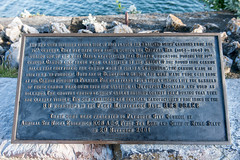Crimean War
(1863-1866)
thing and war
Died aged c. 3
Wikidata WikipediaThe Crimean War was fought from October 1853 to February 1856 between Russia and an ultimately victorious alliance of the Ottoman Empire, France, the United Kingdom and Piedmont-Sardinia. Geopolitical causes of the war included the decline of the Ottoman Empire, the expansion of the Russian Empire in the preceding Russo-Turkish Wars, and the British and French preference to preserve the Ottoman Empire to maintain the balance of power in the Concert of Europe. The flashpoint was a disagreement over the rights of Christian minorities in Palestine, then part of the Ottoman Empire, with the French promoting the rights of Roman Catholics, and Russia promoting those of the Eastern Orthodox Church. The churches worked out their differences with the Ottomans and came to an agreement, but both the French Emperor Napoleon III and the Russian Tsar Nicholas I refused to back down. Nicholas issued an ultimatum that demanded the Orthodox subjects of the Ottoman Empire be placed under his protection. Britain attempted to mediate and arranged a compromise to which Nicholas agreed. When the Ottomans demanded changes to the agreement, Nicholas recanted and prepared for war. In July 1853, Russian troops occupied the Danubian Principalities (now part of Romania but then under Ottoman suzerainty). On 16 October [O.S. 4 October] 1853, having obtained promises of support from France and Britain, the Ottomans declared war on Russia. Led by Omar Pasha, the Ottomans fought a strong defensive campaign and stopped the Russian advance at Silistra (now in Bulgaria). A separate action on the fort town of Kars, in the Ottoman Empire, led to a siege, and an Ottoman attempt to reinforce the garrison was destroyed by a Russian fleet at the Battle of Sinop in November 1853. Fearing an Ottoman collapse, the British and the French had their fleets enter the Black Sea in January 1854. They moved north to Varna in June 1854 and arrived just in time for the Russians to abandon Silistra. After a minor skirmish at Köstence (now Constanța), the allied commanders decided to attack Russia's main naval base in the Black Sea, Sevastopol, on the Crimean Peninsula. After extended preparations, allied forces landed on the peninsula in September 1854 and marched their way to a point south of Sevastopol after they had won the Battle of the Alma on 20 September 1854. The Russians counterattacked on 25 October in what became the Battle of Balaclava and were repulsed, but the British Army's forces were seriously depleted as a result. A second Russian counterattack, at Inkerman (November 1854), ended in a stalemate as well. By 1855, the Italian Kingdom of Sardinia sent an expeditionary force to Crimea sided with France, Britain and the Ottoman Empire. The front settled into the siege of Sevastopol, involving brutal conditions for troops on both sides. Smaller military actions took place in the Baltic (1854–1856; see Åland War), the Caucasus (1853–1855), the White Sea (July–August 1854) and the North Pacific (1854–1855). Sevastopol finally fell after eleven months, after the French had assaulted Fort Malakoff. Isolated and facing a bleak prospect of invasion by the West if the war continued, Russia sued for peace in March 1856. France and Britain welcomed the development, owing to the conflict's domestic unpopularity. The Treaty of Paris, signed on 30 March 1856, ended the war. It forbade Russia from basing warships in the Black Sea. The Ottoman vassal states of Wallachia and Moldavia became largely independent. Christians in the Ottoman Empire gained a degree of official equality, and the Orthodox Church regained control of the Christian churches in dispute. The Crimean War was one of the first conflicts in which military forces used modern technologies such as explosive naval shells, railways and telegraphs. The war was also one of the first to be documented extensively in written reports and in photographs. The war quickly became a symbol of logistical, medical and tactical failures and of mismanagement. The reaction in Britain led to a demand for professionalisation of medicine, most famously achieved by Florence Nightingale, who gained worldwide attention for pioneering modern nursing while she treated the wounded. The Crimean War marked a turning point for the Russian Empire. The war weakened the Imperial Russian Army, drained the treasury and undermined Russia's influence in Europe. The empire would take decades to recover. Russia's humiliation forced its educated elites to identify its problems and to recognise the need for fundamental reforms. They saw rapid modernisation as the sole way to recover the empire's status as a European power. The war thus became a catalyst for reforms of Russia's social institutions, including the abolition of serfdom and overhauls in the justice system, local self-government, education and military service.
DbPedia
Commemorated on 1 plaque
The two guns situation either side of this plaque are restored ships' cannons from the 19th century. They may have seen action during the Crimean War (1863-1866) or during one of the many naval expeditions that Britain undertook during the 19th century. Cannon like these were classified by the weight of the round iron cannon balls that they fired: the cannon made in 1811 is a '24 pounder', the cannon made in 1819 is an '18 pounder'. Both are of Blomfield design and were made from cast iron at the Carron Foundry in Falkirk. For many years after their working life the barrels of these cannon were sunk into the quayside at Devonport Dockyard and used as bollards. The grooves caused by ships cables rubbing against them during that time are clearly visible. The gun carriages are replicas, manufactured from iron in the RN workshops ink the Fleet Maintenance Base, HMS Drake These guns were presented to Plymouth City Council by Admiral Sir Nigel Essenhigh KCB ADC, First Sea Lord and Chief of Naval Staff on 29 November 2001
Madeira Road, Plymouth, United Kingdom where it was
